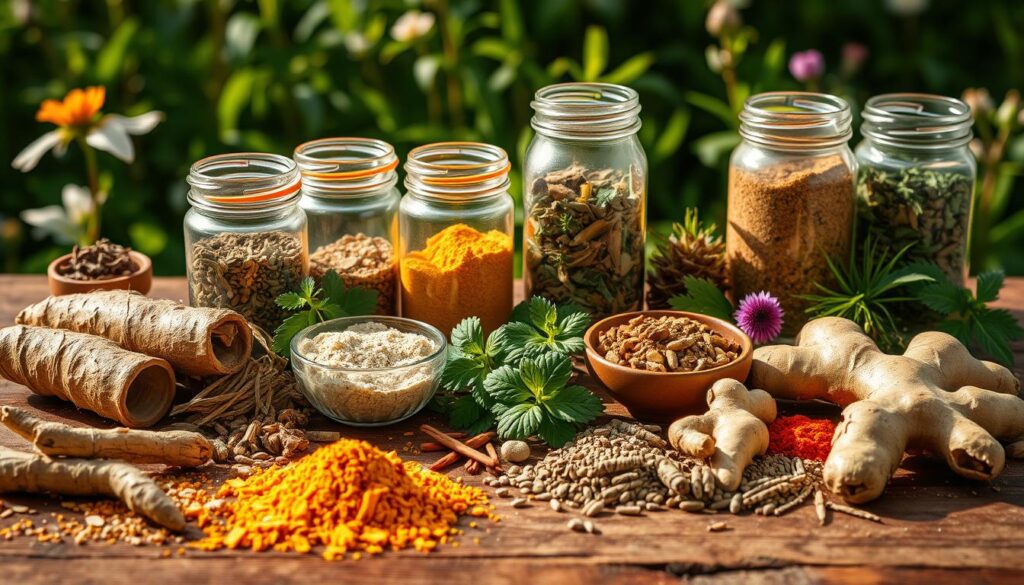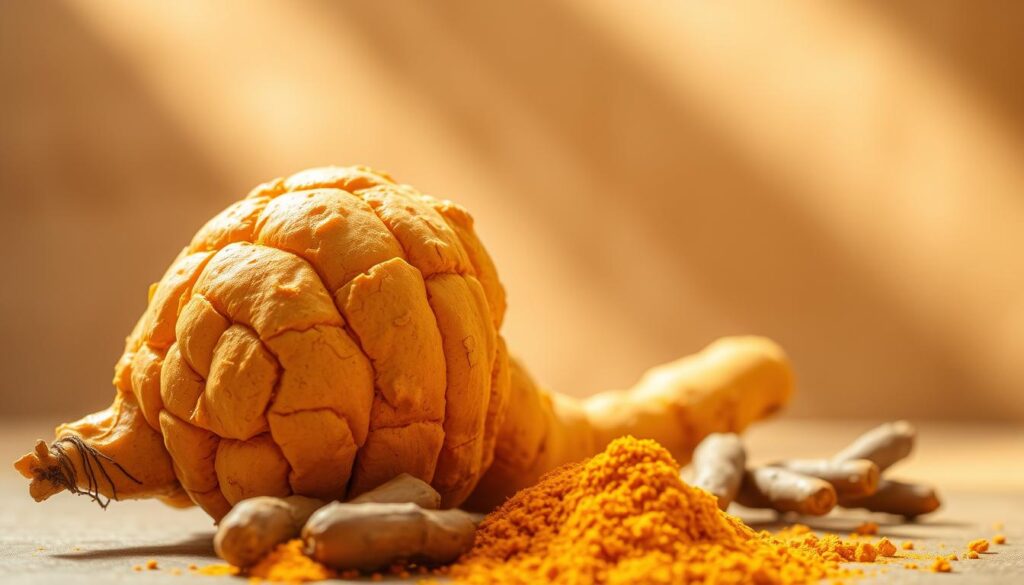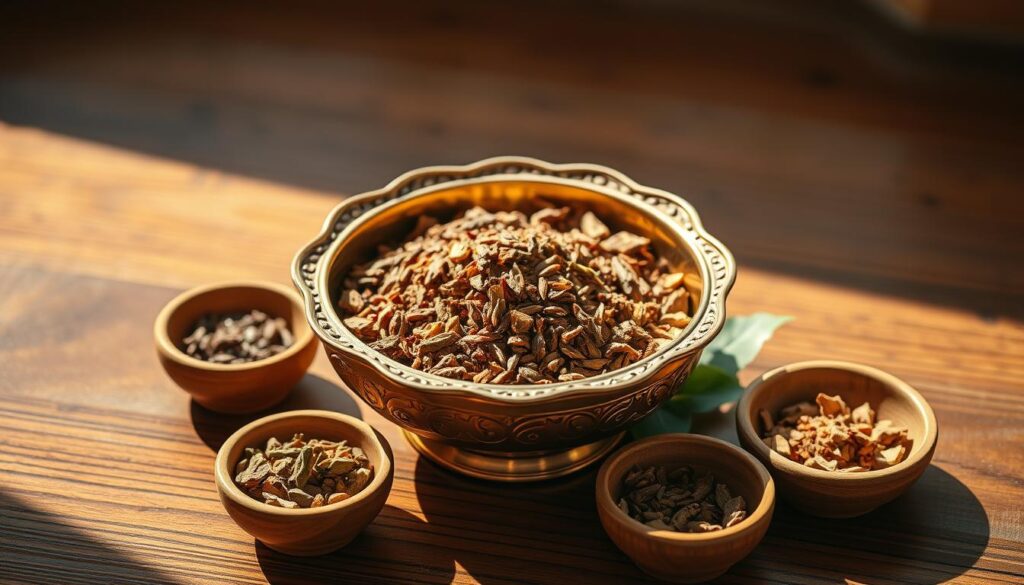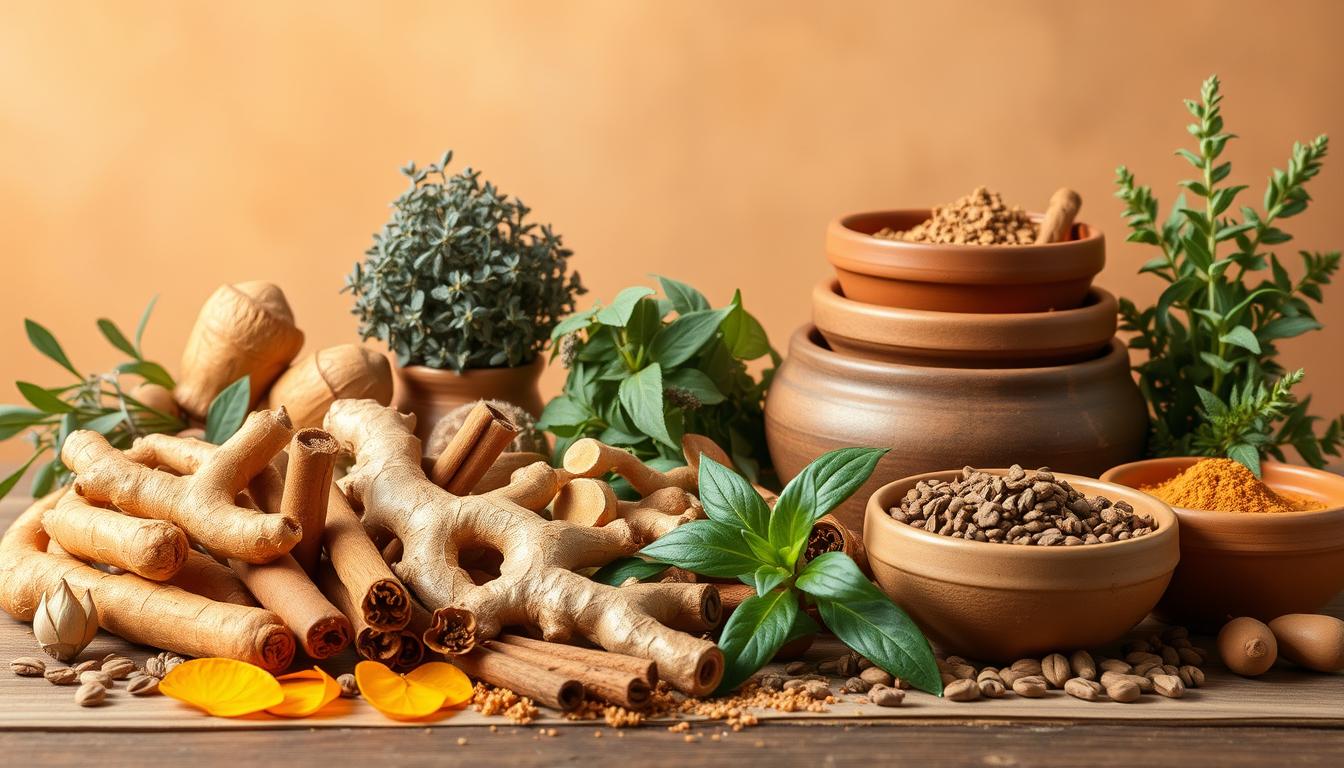Are you tired of synthetic treatments that just cover up symptoms? What if nature had the answer to better health and wellness?
Ayurvedic herbs are a natural way to improve your health. They’ve been around for thousands of years. My exploration of these herbs showed their great promise for overall wellness.
Traditional medicine is more than just quick fixes. Ayurvedic remedies aim to fix the root of health problems. They support your body’s natural healing. These herbs are like ancient wisdom for today’s wellness needs.
Key Takeaways
- Ayurvedic herbs provide complete health support
- Natural options can work alongside traditional medicine
- Each herb has its own health benefits
- Choosing the right herbs for you is key
- Always talk to a healthcare expert before starting
- It’s important to get high-quality herbs
Introduction to Ayurvedic Medicine
I’m passionate about finding holistic wellness solutions. Ayurveda, an ancient Indian medicine, has caught my eye. It’s more than just treating sickness; it’s a way of life that connects body, mind, and spirit.
Ayurveda sees health as a balance between inside and outside. It focuses on preventing disease and improving wellness with personalized plans.
Understanding the Foundations
Ayurvedic principles are based on a few key ideas:
- Individual constitution (doshas)
- Harmony with natural rhythms
- Personalized healing approaches
- Holistic lifestyle integration
“Health is not just the absence of disease, but a state of complete physical, mental, and social well-being.” – Ayurvedic Wisdom
Ayurveda talks about three main energy types or doshas: Vata, Pitta, and Kapha. Each person has a mix of these energies that shapes their health and personality. Knowing your dosha helps you choose the right lifestyle and food for balance.
Interestingly, holistic wellness solutions like Ayurveda are becoming more popular. People are looking for health approaches that tackle the root causes, not just symptoms.
Importance of Herbs in Ayurveda

Ayurvedic herbs have been key to holistic healing for thousands of years. They come from India, where they’ve been used for over 5,000 years. These natural remedies are more than supplements; they’re a complete health system.
The history of Ayurvedic herbs is impressive. About 90% of Ayurvedic treatments use plants. Ayurvedic wellness practices aim to prevent and balance health, treating the whole body, not just symptoms.
Traditional Healing Wisdom
My research shows how these herbs work:
- Polyherbal combinations often prove more effective than single herbs
- Classical preparations typically combine 3 to 30 different plants
- Each herb is selected for its unique healing properties
Integrating Herbs into Daily Life
Adding herbal remedies to your life is easy. Simple steps can make a big difference:
- Start with gentle, well-known herbs like turmeric
- Brew herbal teas
- Incorporate spices into cooking
- Consult with Ayurvedic practitioners for personalized guidance
Caution is key. While Ayurvedic herbs are powerful, they must be used wisely. Always research and understand each herb’s specific characteristics and possible interactions.
Turmeric: The Golden Spice

I’m excited to share the amazing benefits of turmeric, a top Ayurvedic herb. This bright yellow root is more than a spice. It’s a powerful medicine used for thousands of years.
Turmeric has a special compound called curcumin. It offers incredible health benefits. Here are some of them:
- Potent anti-inflammatory capabilities
- Strong antioxidant protection
- Natural immune system support
Anti-Inflammatory Powerhouse
Turmeric can really change your health. Studies show that curcumin works better when mixed with black pepper. This boosts how well your body uses its healing powers.
For people with joint pain, turmeric is a natural choice. It’s a safer option than some medicines.
Boosting Immunity Naturally
Eating foods with turmeric can help prevent chronic diseases. It’s great for boosting your immune system. Just 200-1000 mg daily can provide significant health benefits.
Turmeric isn’t just a spice – it’s nature’s medicine cabinet in a root!
Here are easy ways to add turmeric to your diet:
- Golden milk lattes
- Turmeric tea
- Roasted vegetables with turmeric
- Dietary supplements
Always talk to your doctor before trying new health supplements or changing your diet.
Ashwagandha: The Stress Reliever
In today’s fast world, managing stress is key for good health. Ashwagandha, a natural Ayurvedic remedy, offers a way to find balance and calm.

Recent studies show Ashwagandha’s power. They found it helps a lot with stress and mental health:
- 69% reduction in stress levels for participants
- 50% decrease in anxiety symptoms
- 28% reduction in cortisol hormone levels
Adaptogenic Powers of Ashwagandha
Ashwagandha is an adaptogen that helps your body fight stress. Withania somnifera, its scientific name, boosts your body’s stress-fighting abilities. I’ve seen how it changes how you face daily challenges.
Enhancing Mental Clarity
Ashwagandha does more than just reduce stress. It also boosts your brain power. Studies show 60% of people taking it got better memory and focus. Its special compounds improve mental sharpness and calmness.
Ashwagandha represents nature’s intelligent approach to wellness, bridging traditional wisdom with modern scientific understanding.
Experts suggest taking 250 mg to 600 mg daily. This makes Ashwagandha a simple, natural way to ease stress and improve mental clarity.
Tulsi (Holy Basil): The Sacred Herb

Tulsi is a standout in Traditional Indian medicine. It’s called the “Queen of Herbs” and has been used for thousands of years. I was amazed by its power for holistic wellness.
Tulsi is not just any herb. Ocimum tenuiflorum is its scientific name, and it’s packed with health benefits. Studies have shown it can support overall health.
Respiratory Health Benefits
My research showed Tulsi’s great benefits for the lungs. It has been found to:
- Improve lung function
- Reduce inflammation in respiratory passages
- Support natural immune responses
“Tulsi is nature’s gift to respiratory health” – Ayurvedic Healing Tradition
Stress Reduction Potentia
Tulsi is also great for managing stress. Studies have shown it can:
- Lower cortisol levels
- Improve mental clarity
- Enhance emotional balance
A 2022 study found Tulsi can reduce stress and improve sleep. While more research is needed, the results are very encouraging for natural stress relief.
Triphala: A Powerful Trio

In my journey exploring herbal remedies, I’ve found Triphala. It’s an amazing Ayurvedic wellness practice that has helped people for over 1,000 years. This special mix of three fruits—Amla, Bibhitaki, and Haritaki—makes a strong natural supplement. It supports overall health in a holistic way.
Digestive Health Support
Triphala is great for digestive health. It helps keep bowel movements regular, easing issues like constipation, bloating, and gas. I’ve seen how it can change gut health for the better. A study with 62 adults showed big improvements in digestion with regular Triphala use.
Detoxification Properties
Triphala does more than just help with digestion. It cleanses the liver, purifies blood, and supports the kidneys. Its antioxidants make it a top choice for wellness. Research shows it can:
- Reduce inflammation
- Boost the immune system
- Help with weight management
- Improve skin health
For those into Ayurvedic wellness, Triphala is a gentle yet powerful way to support health. Take 500 mg to 1 gram daily, best with warm water on an empty stomach.
Ginger: The Versatile Root

Ginger is a top natural health supplement with a long history. For thousands of years, ancient civilizations knew its health benefits. Now, science confirms its power.
In Ayurvedic medicine, ginger is seen as a healing root. Confucius himself noted in 500 BC that he never ate a meal without ginger. This shows its amazing digestive benefits.
Digestive Support Mechanisms
Ginger has many benefits for your digestive health:
- Stimulates digestive enzyme production
- Reduces intestinal gas and bloating
- Supports nutrient absorption
- Promotes comfortable digestion
Anti-Nausea Capabilities
“Ginger’s healing power transcends ordinary spices” – Traditional Ayurvedic Wisdom
Ginger is known for its strong anti-nausea effects. Studies show it helps with motion sickness, morning sickness, and post-surgical nausea. The key compound [6]-gingerol is behind these benefits.
When choosing ginger supplements, find ones with standardized extracts. Look for 250 mg to 2 g daily for the best health benefits.
Neem: The Healing Tree
Neem is a key Ayurvedic treatment option, deeply rooted in traditional healing. It comes from the Indian subcontinent. This tree is known as the “village pharmacy” for its many health benefits.

Neem is packed with over 140 active compounds. It offers great benefits for holistic wellness. Its uses range from skin care to internal health, making it a botanical wonder.
Skin Health Benefits
Neem’s skin-healing properties are well-documented. A 2013 case study showed it could heal chronic skin ulcers in 34 days.
- Effective against fungal infections
- Reduces skin inflammation
- Supports natural skin healing
“Neem is nature’s gift for complete skin wellness.” – Ayurvedic Healing Tradition
Blood Purification Properties
Research shows neem’s benefits for internal health. A 2020 systematic review found it has strong antioxidant and anti-inflammatory effects. It may help manage blood sugar and support metabolic health.
- Supports healthy blood circulation
- Helps reduce inflammatory markers
- Potential support for metabolic functions
Note: Always consult healthcare professionals before adding new herbal treatments to your routine.
Cinnamon: A Flavorful Ally

Cinnamon is a standout Ayurvedic herb, known for its health benefits. It has been used for over 2,800 years. People value it for its taste and health perks.
Blood Sugar Regulation
Studies show cinnamon might help control blood sugar. A 2015 review found it could manage glucose levels. It also lowers triglycerides and cholesterol.
- Insulin-potentiating effects 20 times higher than other spices
- Potential to support metabolic health
- Natural approach to blood sugar management
Antioxidant Powerhouse
Cinnamon is packed with antioxidants. Its essential oils, rich in cinnamaldehyde, offer great health benefits.
- Protects against cellular damage
- Supports brain health
- May help reduce inflammation
Pro tip: Choose Ceylon cinnamon for the highest quality and health benefits.
Cinnamon isn’t just a spice – it’s a natural medicine with centuries of traditional use and modern scientific backing.
Conclusion: Embracing Ayurvedic Herbs
Exploring Ayurvedic wellness has shown me a deep way to health. It’s more than just herbs. It’s a path to balance that touches both body and mind.
Adding Ayurvedic herbs to your life needs careful thought. Each one has special benefits for your health. Tulsi boosts your immune system, while Ashwagandha helps with stress.
Understanding your body’s needs is key in Ayurveda. A good practitioner can guide you to the right herbs. Start small and see how your body reacts.
Ayurvedic herbs are a proven way to improve your health naturally. They help you live a balanced, vibrant life. It’s a way to care for your body and mind.
Source Links
- https://www.verywellhealth.com/popular-ayurvedic-herbs-88822 – 12 Ayurvedic Herbs Used for Healing
- https://mountaintopclinic.com/discover-the-magic-of-ayurvedic-herbs-6-powerful-remedies-for-wellness/ – Magic of Ayurvedic Herbs: 6 Powerful Remedies for Wellness
- https://oshwellness.com/blogs/news/top-15-ayurvedic-herbs-and-their-health-benefits?srsltid=AfmBOooOxtAN560-Tx7AnlzRRC_x3i72B8LpJu9yNdVJ0lhnK7N5PvbP – Top 15 Ayurvedic Herbs and Their Health Benefits
- https://www.healthline.com/nutrition/ayurvedic-herbs – 12 Powerful Ayurvedic Herbs and Spices with Health Benefits
- https://www.hopkinsmedicine.org/health/wellness-and-prevention/ayurveda – Ayurveda
- https://www.webmd.com/balance/ayurvedic-treatments – What Is Ayurveda?
- https://health.clevelandclinic.org/what-is-ayurveda – What Is Ayurveda and Does It Work?
- https://pmc.ncbi.nlm.nih.gov/articles/PMC5871155/ – The Significance of Ayurvedic Medicinal Plants
- https://www.hopkinsmedicine.org/health/wellness-and-prevention/turmeric-benefits – Turmeric Benefits
- https://www.ncbi.nlm.nih.gov/books/NBK92752/ – Turmeric, the Golden Spice – Herbal Medicine
- https://www.webmd.com/vitamins/ai/ingredientmono-953/ashwagandha – ASHWAGANDHA: Overview, Uses, Side Effects, Precautions, Interactions, Dosing and Reviews
- https://ods.od.nih.gov/factsheets/Ashwagandha-HealthProfessional/ – Office of Dietary Supplements – Ashwagandha: Is it helpful for stress, anxiety, or sleep?
- https://www.healthline.com/nutrition/ashwagandha – 9 Proven Health Benefits of Ashwagandha
- https://health.clevelandclinic.org/benefits-of-holy-basil – 5 Health Benefits of Holy Basil
- https://www.healthline.com/health/food-nutrition/basil-benefits – Holy Basil: Benefits for Your Brain and Your Body
- https://www.healthline.com/nutrition/triphala – What Are the Benefits of Triphala?
- https://www.ayurvediq.co.uk/blog/top-10-benefits-of-triphala – Top 10 Benefits of Triphala — AYURVEDIQ
- https://www.banyanbotanicals.com/blogs/wellness/getting-to-know-your-herbal-allies-ginger?srsltid=AfmBOorqq9DDDzSwINob6OT5dxApNOeSKT0PQiDhDqGmBg822AjcJdqe – Ginger: Getting to Know Your Herbal Allies
- https://www.ncbi.nlm.nih.gov/books/NBK92775/ – The Amazing and Mighty Ginger – Herbal Medicine
- https://www.medicalnewstoday.com/articles/325048 – Neem: Benefits, risks, and how to use
- https://www.healthline.com/nutrition/neem – What Is Neem Extract? Benefits, Uses, Risks, and Side Effects
- https://www.ncbi.nlm.nih.gov/books/NBK234637/ – Medicinals – Neem – NCBI Bookshelf
- https://www.medicalnewstoday.com/articles/healthy-herbs-and-spices – 10 healthy herbs and spices: Anti-inflammatory, nutritious, and more
- https://blog.theayurvedaexperience.com/cinnamon-everything-you-need-to-know/ – Cinnamon: Everything You Need To Know
- https://theayurvedicclinic.com/5-powerful-ayurvedic-herbs-that-will-transform-your-life/ – 5 Powerful Ayurvedic Herbs to Transform Your Life – The Ayurvedic Clinic
- https://www.tatvaayurved.com/blog-detailed/ayurvedic-herbs-benefits-treatment – Top Ayurvedic Herbs and Their Healing Benefits Explained





